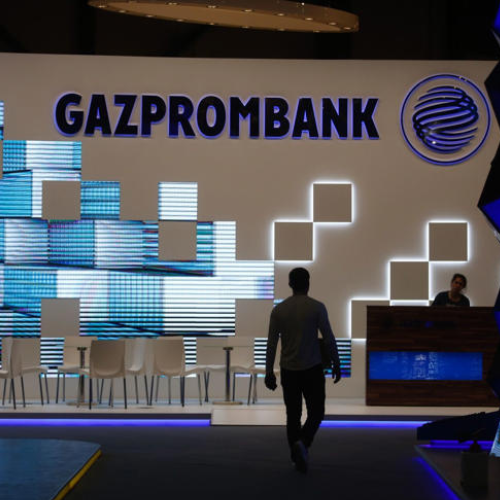The European Union (EU) is in the midst of complex discussions with the United States (US) to find ways to soften the impact of sanctions on Russia’s Gazprombank. Gazprombank, a critical financial institution for facilitating payments for Russian natural gas, has become a focal point for both the EU and the US amid heightened tensions over the ongoing war in Ukraine.
Although Russian President Vladimir Putin recently eased a rule requiring payments for gas to be processed solely through Gazprombank, the EU still faces hurdles in ensuring secure and legal payment channels. These challenges arise as both European governments and companies attempt to navigate the legal complexities of continuing gas imports from Russia while adhering to US sanctions.
The Critical Role of Gazprombank
Gazprombank plays a vital role in allowing European countries to purchase Russian natural gas. Historically, Russia supplied a significant portion of Europe’s energy, with pipeline gas dominating the market. However, after Russia’s invasion of Ukraine, the US and EU imposed harsh sanctions on many Russian entities, including Gazprombank.
Initially, the US delayed sanctions on Gazprombank to help Europe manage its energy crisis, as the bloc was heavily dependent on Russian gas. But last month, the US officially sanctioned the bank as part of its broader efforts to penalize Moscow for its actions in Ukraine.
Despite the sanctions, Gazprombank remains essential for energy payments. Under a previous rule introduced by Putin in 2022, European buyers were required to pay for Russian gas in rubles, converting their money via Gazprombank. This move led some countries, like Poland and Bulgaria, to stop purchasing Russian gas after refusing to comply. However, other nations, such as Hungary and Slovakia, continued to rely on the pipeline supplies.
US Sanctions Gazprombank to Limit Russia’s War Funding
While Putin’s recent decision to lift the ruble-payment rule eased some tensions, it introduced new uncertainties. Gazprombank remains the only authorized institution for processing payments, leaving banks and companies wary of accidentally violating US sanctions.
Exploring a Luxembourg-Based Solution
To resolve this issue, the EU and the US are reportedly exploring whether payments for Russian gas can be routed through Gazprombank’s subsidiary in Luxembourg. This subsidiary could potentially act as a safe channel, ensuring payments are compliant with sanctions.
The idea of using the Luxembourg-based subsidiary is one of several options being discussed, according to unnamed sources familiar with the talks. Another idea involves identifying alternate payment methods entirely. However, financial institutions involved in these transactions remain cautious, as they do not want to risk unintentionally breaking US sanctions.
The Luxembourg option could offer a middle ground for European companies needing to make payments for Russian gas without engaging directly with Gazprombank in Russia. However, these talks are still ongoing, and no final decision has been made.
Russia’s Shrinking Role in Europe’s Gas Market
The EU’s current predicament is rooted in its historical dependence on Russian gas, which made up more than 40% of the bloc’s imports before the war in Ukraine. Over the past two years, Europe has worked aggressively to reduce its reliance on Russian energy, diversifying its sources to include liquefied natural gas (LNG) from the US and pipeline gas from Norway.
Gas Supply at Risk: Hungary’s Fight for Payment Relief
As a result, Russia’s share of Europe’s gas imports has plummeted to less than 15%. Norway has now overtaken Russia as Europe’s top supplier, providing 30% of the region’s gas, while the US accounts for 19% of imports, thanks to LNG shipments.
Despite these efforts, some EU countries, particularly Hungary and Slovakia, still depend on Russian pipeline gas. This reliance is partly why the EU is pressing the US to consider leniency or flexibility in how sanctions on Gazprombank are implemented.
Earlier this week, Hungary submitted a formal request to the US for a waiver that would allow it to continue using Gazprombank for gas payments. Such appeals underscore the balancing act the EU faces as it seeks to maintain energy security while complying with international sanctions.
Complications in the Payment System
While Putin’s recent decree to allow foreign buyers to use other banks for currency conversions has provided some relief, it has also introduced additional confusion into the payment system. Buyers are unclear about which banks are legally safe to use, and many are hesitant to proceed without assurances that they are not violating sanctions.
The ongoing discussions between the EU and the US aim to clarify these legal ambiguities and establish a reliable framework for payments. Until then, European financial institutions remain cautious, highlighting the risks involved in navigating sanctions while ensuring a steady flow of gas to the region.
This complex situation reveals the delicate balance the EU must maintain to keep its energy supplies secure without contravening US-imposed sanctions. As talks continue, both sides are working to find a solution that protects European energy interests without compromising broader geopolitical goals.


